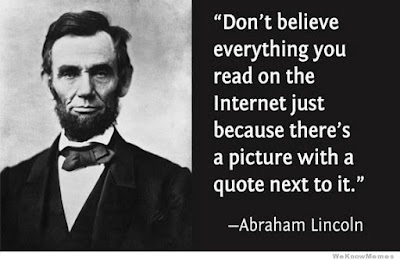Memes aren't news
One of the funniest memes I’ve seen online was this one:
While it’s funny, it also reveals something pretty annoying
about modern culture – people are increasingly getting their news from memes
and headlines.
Context be damned – if you read a headline that seems a little off, well let the outrage commence!
It happens more often than you think. Perhaps one of the most egregious examples of
recent times was this one:
The message is clear – politicians are self-interested and
couldn’t care less about disabled people having their benefits cut, but boy-oh-boy do they care about their own pay.
This meme went fairly viral, with activist after activist
sharing it on Reddit, Twitter, Facebook and a bunch of other social media platforms.1
The only problem? It
was a fake.
Isabel Hardman is a journalist with The Spectator magazine2 and often works in the British Houses of
Parliament. She actually recognised the
image and found out that it wasn’t from a debate about politicians pay – it was
from Prime Minister's Question Time (where every member is basically required to attend).
Also, the top image in that meme is, apparently, from the ‘end’ of the debate on
welfare reforms for disabled persons. This debate had gone on
several hours. Apparently at the
beginning of the debate, the chamber was packed.
But none of that matters because people will already have
made up their mind. Will the millions of
people who shared the fraudulent image with a sense of smug anarchy ever learn
they participated in a lie? Probably
not.
And, to me, this is the biggest danger of fake news. It’s people who respond to only what other
people tell them, rather than going out and investigating it for
themselves.
You see, it’s far easier to be angry and lazy, than investigative
and not-so-lazy.
I should say, that I’ve been guilty of this too. Just after the recent US Presidential
election, a meme went around purporting to be a quote from C.S Lewis’s book:
The Screwtape Letters
It was a quote that basically summarised the ineptitude and
fruitlessness of arguing about politics.
It was quite compelling. So, off
I went and shared it on my Facebook feed.
What a fool I was!3
Within 24 hours a friend of mine gently pointed out that it was a fake
quote. Someone had made it up and shared
it because they presumably thought it’d get a laugh.
But you see, going back to the book and looking up the quote
would’ve been time-consuming. It was far
easier just to assume it was genuine and participate in sharing it.
What about you? How
stringent are your authenticity checks when sharing memes and the like?
Because mine are certainly far stricter now.
Footnotes
- What other platforms could something like this go viral on? Snapchat? Pinterest? Can stuff even go viral on those things??
- The Spectator is a centre-right magazine in the UK and Australia. I actually have had two columns published in the magazine. Miraculously despite not having published me again their subscriptions remain strong.
- This is actually CRAZY embarrassing as I am a massive Lewis fan. If anyone should've picked it as a fake, it should've been me.



Comments